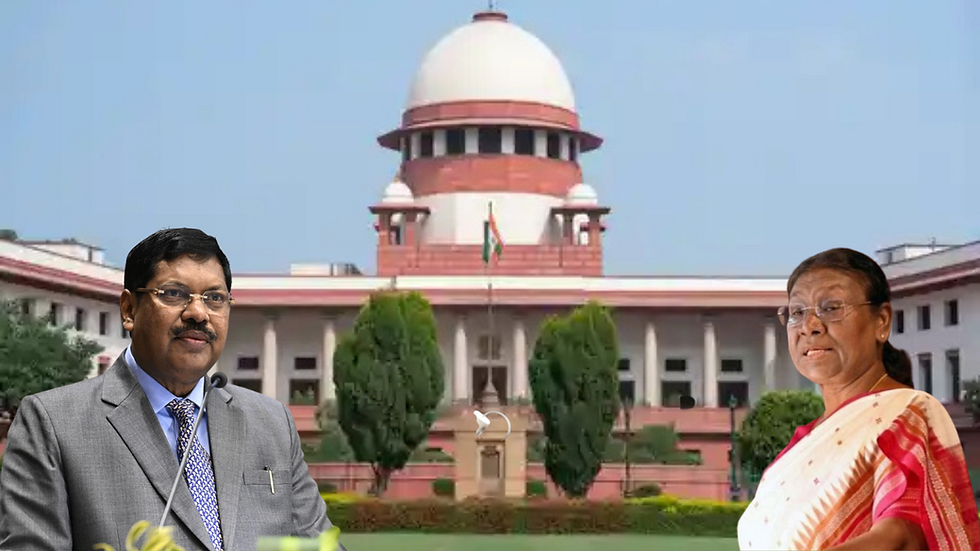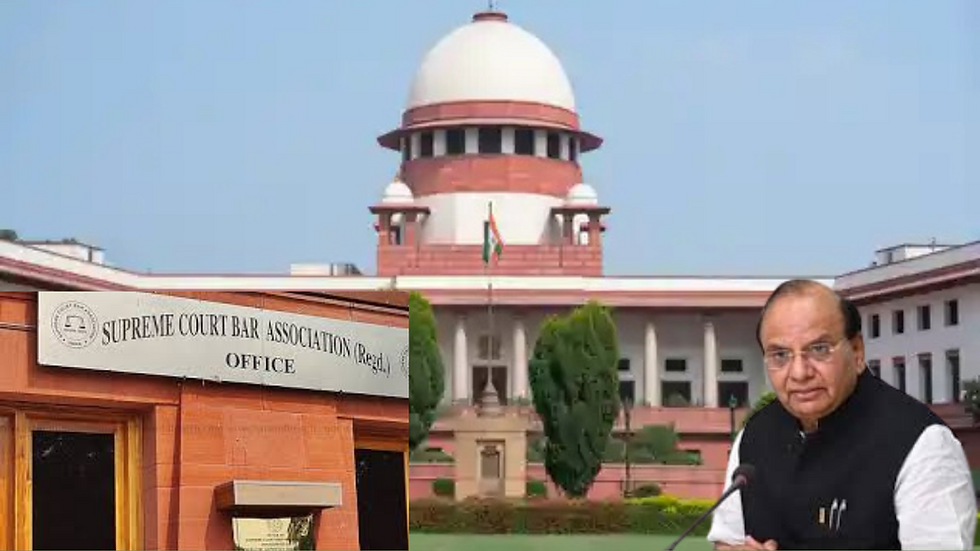Tamil Nadu has told the Supreme Court that while a bill may be illegal, the constitutional scheme regarding the binding nature of the aid and advice will not change.
- JainSir Classes
- Aug 29
- 7 min read
Today, on 28th August, during the Presidential Reference hearing, Day 6, Tamil Nadu told the Supreme Court that the bill may be illegal, but the constitutional scheme will not change the binding nature of the aid and advice, reinforcing the state’s position on the Governor’s role in assent.

New Delhi: The Supreme Court’s five-judge Constitution Bench led by Chief Justice of India B.R. Gavai heard Presidential Reference case on whether fixed timelines can be imposed on Governors and the President for giving assent to State bills.
The matter is being heard under Article 143 of the Constitution, after the Court’s earlier ruling in April 2025 in the case of State of Tamil Nadu v. Governor.
The Tamil Nadu government presented its case to the Supreme Court, arguing that allowing Governors to withhold assent on money bills passed by a State legislature would effectively grant them the role of a “super Chief Minister” of the State.
During the hearing, Tamil Nadu stated,
“Governor is a part of the legislative process, but he is not part of the legislation of the State. He is not a legislator.”
This argument was made by Senior Advocate Abhishek Manu Singhvi before the Constitution Bench, which includes Chief Justice of India BR Gavai and Justices Surya Kant, Vikram Nath, PS Narasimha, and Atul S Chandurkar.
The hearing pertains to a reference made by President Droupadi Murmu to the Supreme Court under Article 143 of the Constitution.
The reference questions the Court’s April ruling that established timelines for the President and the Governor to decide on bills.
Singhvi’s remarks were in response to a statement made by Senior Advocate Harish Salve, representing the Maharashtra government, on August 26, in which he claimed that a Governor could refuse assent to money bills.
Singhvi argued,
“It is in sync with the submission that the Governor is not [just] in a dominating position, he is super Chief Minister…possibly trenching beyond super Chief Minister also.”
In response to Solicitor General Tushar Mehta’s assertion that Article 207 applies to money bills presented with the Governor’s recommendation rendering the question of withholding assent irrelevant Singhvi argued that Article 207 is intended to prevent private-member money bills.
He further contended that the Governor is obligated to act according to the advice of the council of ministers, even regarding money bills.
Singhvi also questioned whether the Constitution states that the final authority on a bill rests with the Governor rather than with an elected government.
Singhvi asserted that both the Governor and the President are primarily symbolic leaders with limited discretion in executive decision-making, except for a few specific instances.
Singhvi added,
“There is strong material to show that in each of three options in Article 200, the Governor is bound by council of ministers in returning or referring it to President,”
He emphasized that there is no provision for a bill to be rejected or to fail. Such an interpretation would undermine Article 200, he argued. Singhvi maintained that the Governor’s first option is to withhold assent only to return the bill to the legislature.
Referring to Article 200, he added,
“Withholding must lead to returning. You can return only when you withhold…It (permanent withholding) will make mockery of whole proviso,”
At this point, Chief Justice Gavai remarked,
“Otherwise, the word as soon as possible will be rendered otiose if you withhold for eternity.”
Singhvi further argued that while the Governor is involved in the legislative process, he does not participate in the actual law-making process.
In response to Singhvi’s claim that the Governor must always act on the advice of the council of ministers, Justice Narasimha inquired about the scenario where assent is insisted upon even if the bill violates certain constitutional provisions.
The judge asked,
“He has no option according to you?”
Singhvi replied that the Governor does not serve as a judge of legality,
“He has no option. The bill may be illegal…it will be challenged in Court. Your lordships may strike it down. Constitutional scheme will not change about the binding nature of the aid and advice.”
During the hearing Solicitor General Tushar Mehta said,
“I had to take instructions on two questions … Whether writ will lie on behalf of State government and then on the ambit of Article 361. The president says she would require assistance of your Lordships.”
He added,
“This has to be answered else the questions will keep arising.”
The Solicitor General explained that the Supreme Court cannot direct the Governor through a mandamus.
Mr. Mehta explained,
“Will a writ petition lie on the behest of the State government? Article 32 lies when there is a violation of fundamental rights. State government, a constitutional body, cannot have fundamental rights. It is a protector of the fundamental rights of ordinary citizens,”He further submitted,“State government is repository of functions to protect the fundamental right of citizens. It cannot file a Article 32 plea by itself.”
Earlier, On August 19, the Court examined the maintainability of the reference. During the proceedings, Attorney General for India R. Venkataramani challenged the Supreme Court’s ruling from April, questioning whether the Court has the authority to amend the Constitution.
The Court remarked, On August 20, that permitting a Governor to indefinitely withhold assent to bills passed by the State legislature would subject the elected State government to the arbitrary decisions of an unelected Governor.
In the subsequent hearing on August 21, the Court inquired whether it should remain passive when a Governor delays action on a bill passed by the legislature for an extended period.
The ruling in question was delivered by a Bench led by Justices JB Pardiwala and R Mahadevan in the case of State of Tamil Nadu v The Governor of Tamil Nadu & Anr. The Supreme Court concluded that Governors must act within a reasonable timeframe and that constitutional silence cannot be used to obstruct the democratic process.
The Court stated that although Article 200 does not define a specific time limit, it should not be interpreted as allowing the Governor to delay indefinitely in acting on Bills passed by the State legislature.
Regarding the President’s authority under Article 201, the Court ruled that her decision-making is subject to judicial scrutiny and must occur within three months. If there is any delay beyond this period, the reasons must be documented and communicated to the relevant State. Following this ruling, the President submitted fourteen questions to the Supreme Court, expressing concerns about the interpretation of Articles 200 and 201.
In May, President Droupadi Murmu exercised powers under Article 143(1) to seek clarification from the Supreme Court regarding whether judicial orders could impose timelines on the President’s discretion when dealing with state assembly bills.
The hearing has been scheduled to continue next Tuesday.
Background
The Presidential Reference followed the April 8 Supreme Court ruling which held that Governors cannot indefinitely sit on Bills passed by State legislatures. Though Article 200 does not mention a deadline, the Court said Governors must act within a reasonable time and cannot stall the democratic process.
The Court also held that under Article 201, the President must decide on Bills within three months. If delayed, reasons must be recorded and conveyed to the concerned State.
The exact words of the April 8 judgment were:
“The President is required to take a decision on the Bills within a period of three months from the date on which such reference is received and in case of any delay beyond this period, appropriate reasons would have to be recorded and conveyed to the concerned State.”
President Murmu later sent 14 questions to the Court, asking whether the judiciary could impose such deadlines and whether the concept of “deemed assent” was constitutionally valid.
While the Centre backs the Reference, arguing that Governors’ powers cannot be curtailed by judicial timelines, both Kerala and Tamil Nadu have asked the Court to dismiss it as not maintainable.
These are the 14 key questions raised by the President:
“What are the constitutional options before a governor when a bill is presented to him under Article 200 of the Constitution of India?”
“Is Governor bound by the aid and advice of the council of ministers while exercising all the options available with him when a bill is presented before him under Article 200 of the Constitution of India?”
“Is the exercise of constitutional discretion by Governor under Article 200 of the Constitution of India justiciable?”
“Is Article 361 of the Constitution of India an absolute bar to judicially review in relation to the actions of Governor under Article 200 of the Constitution of India?”
“In the absence of a constitutionally prescribed time limit and the manner of exercise of powers by Governor, can timelines be imposed and the manner of exercise be prescribed through judicial orders for the exercise of all powers under Article 200 of the Constitution of India by Governor?”
“Is the exercise of constitutional discretion by President under Article 201 of the Constitution of India justiciable?”
“In the absence of a constitutionally prescribed timeline and the manner of exercise of powers by President, can timelines be imposed and the manner of exercise be prescribed through judicial orders for the exercise of discretion by President under Article 201 of the Constitution of India?”
“In light of the constitutional scheme governing the powers of President, is President required to seek advice of the Supreme Court by way of a reference under Article 143 of the Constitution of India and take the opinion of the Supreme Court when Governor reserves a bill for President’s assent or otherwise?”
“Are decisions of Governor and President under Article 200 and Article 201 of the Constitution of India, respectively, justiciable at a stage anterior into the law coming into force? Is it permissible for the courts to undertake judicial adjudication over the contents of a bill, in any manner, before it becomes law?”
“Can the exercise of constitutional powers and the orders of/by President/Governor be substituted in any manner under Article 142 of the Constitution of India?”
“Is a law made by the state legislature a law in force without the assent of Governor granted under Article 200 of the Constitution of India?”
“In view of the proviso to Article 145 of the Constitution of India, is it not mandatory for any bench of this court to first decide as to whether the question involved in the proceedings before it is of such a nature which involves substantial questions of law as to the interpretation of Constitution and to refer it to a bench of minimum five judges?”
“… the powers of the Supreme Court under Article 142 of the Constitution of India limited to matters of procedural law or Article 142 of the Constitution of India extends to issuing directions/passing orders which are contrary to or inconsistent with existing substantive or procedural provisions of the Constitution or law in force?”
“Does the Constitution bar any other jurisdiction of the Supreme Court to resolve disputes between the Union government and the state governments except by way of a suit under Article 131 of the Constitution of India?”
Case Title: Re: Assent, Withholding, or Reservation of Bills by the Governor and President of India | SPL. REF. No. 1/2025 XVII-A



Comments